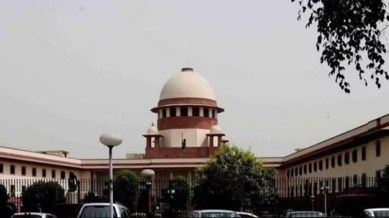Stay updated with the latest - Click here to follow us on Instagram
SC upholds inclusion of ‘socialist’, ‘secular’ in Constitution Preamble
A bench of Chief Justice of India Sanjiv Khanna and Justice P V Sanjay Kumar rejected the argument about the Preamble of the Constitution having a cut-off date.

The Supreme Court on Monday dismissed petitions challenging the constitutional validity of the 42nd amendment by which the words ‘secular’ and ‘socialist’ were added to the Preamble of the Constitution during the Emergency days in 1976, saying “these terms have achieved widespread acceptance, with their meanings understood by ‘We, the people of India’ without any semblance of doubt”.
A bench of Chief Justice of India Sanjiv Khanna and Justice Sanjay Kumar said the Parliament’s power under Article 368 to amend the Constitution also extends to the Preamble and rejected the argument that the words could not have been added retrospectively in 1976 to the original Preamble which has a cut off date of November 26, 1949.
The court, which refused to even issue notice on the petitions, said the “writ petitions do not require detailed adjudication as the flaws and weaknesses in the arguments are obvious and manifest”.
The SC judgement said that “while it is true that the Constituent Assembly had not agreed to include the words ‘socialist’ and ‘secular’ in the Preamble, the Constitution is a living document, as noticed above with power given to the Parliament to amend it in terms of and in accord with Article 368”.
It said, “In 1949, the term ‘secular’ was considered imprecise, as some scholars and jurists had interpreted it as being opposed to religion. Over time, India has developed its own interpretation of secularism, wherein the State neither supports any religion nor penalizes the profession and practice of any faith. This principle is enshrined in Articles 14, 15, and 16 of the Constitution…”
On the challenge to the word ‘socialism’, the SC said “in the context should not be interpreted as restricting the economic policies of an elected government of the people’s choice at a given time… Rather, ‘socialist’ denotes the State’s commitment to be a welfare State…”
In this context, the bench also referred to the majority judgment in the 9-Judge Constitution Bench decision in ‘Property Owners Association and Others v. State of Maharashtra and Others’. The verdict “has cleared any doubt and ambiguity, as it is held that the Constitution, as framed in broad terms, allows the elected government to adopt a structure for economic governance which would sub-serve the policies for which it is accountable to the electorate…”.
Rejecting the argument that the amendment was made during Emergency imposed by the then Indira Gandhi government, the SC said this point “was previously deliberated in Parliament, during the consideration of the Constitution Forty-Fifth Amendment Bill, 1978…Subsequently, this Bill was renumbered and called the Constitution Forty-Fourth Amendment Act 1978”.
It also said “the fact that the writ petitions were filed in 2020, forty-four years after the words ‘socialist’ and ‘secular’ became integral to the Preamble, makes the prayers particularly questionable… These terms have achieved widespread acceptance, with their meanings understood by “We, the people of India”. The additions… have not restricted or impeded legislation or policies pursued by elected governments, provided such actions did not infringe upon fundamental and constitutional rights or the basic structure of the Constitution…”